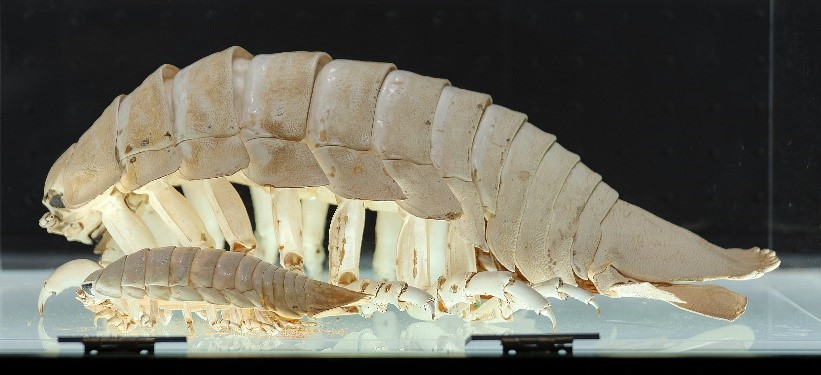Description

Disclaimer: Copyright infringement not intended.
Context
- An international team of marine biologists has discovered a unique isopod, a form of crustacean, that has been formally identified as a new species of the genus Booralana from the deep waters of The Bahamas.
Key Points about Isopods:
Taxonomy:
- Isopods are part of the class Malacostraca, which also includes crabs, lobsters, and shrimp.
- The order Isopoda consists of over 10,000 species, ranging from marine to terrestrial environments.
Habitat and Adaptations:
- Isopods inhabit various ecosystems, including terrestrial environments like leaf litter, soil, and rotting wood, as well as aquatic habitats.
- They are characterized by their flattened, segmented bodies, with seven pairs of legs and a distinctive exoskeleton.
Feeding Habits:
- Isopods are primarily detritivores, playing a crucial role in nutrient cycling by consuming decaying organic matter.
- Some species may also feed on fungi, algae, and other small organisms.
Respiration:
- Isopods breathe through gills, which are modified structures known as
- Their ability to respire on land is facilitated by the presence of specialized structures that allow them to retain moisture.
Reproduction:
- Isopods typically reproduce sexually, with females carrying eggs in a pouch-like structure called the marsupium.
- After hatching, the young isopods resemble miniature adults and undergo a series of molts to reach maturity.
Ubiquitous Presence:
- Isopods are widely distributed across various ecosystems on Earth, adapting to both terrestrial and aquatic environments.
Evolutionary History:
- These crustaceans have a long evolutionary history, dating back more than 300 million years.

Size Variation:
- Isopods exhibit a range of sizes, with many species measuring only a few centimeters in length.
Ecological Roles:
- In deep-sea ecosystems, isopods primarily function as scavengers, playing a vital role in recycling energy.
Scavenging Behavior:
- Despite their crucial role as recyclers, there is evidence that some isopods, particularly in deep-sea environments, can exhibit predatory behavior, attacking living vertebrates such as sharks.
Longevity without Eating:
- Isopods are known for their remarkable ability to survive for several years without consuming food.
Example - Booraland nickorum:
- Booraland nickorum, a newly discovered isopod in Bahamian waters at depths exceeding 500 meters, shares traits with its counterparts.
- This species showcases resilience and adaptability similar to other isopods, surviving in challenging deep-sea conditions.

Ecological Importance:
- Isopods contribute significantly to the decomposition of organic matter, aiding in nutrient recycling in ecosystems.
- Their role as decomposers helps maintain soil fertility and contributes to the overall balance of natural systems.
Economic Significance:
- While isopods are not of direct economic importance, they are valuable indicators of environmental health and ecosystem functioning.
- Some species may be studied for their potential in bioremediation efforts.
|
PRACTICE QUESTION
Question:
Consider the following statements regarding isopods:
1.Isopods are exclusively marine crustaceans that primarily inhabit deep-sea ecosystems.
2.The evolutionary history of isopods dates back approximately 100 million years.
3.Isopods are crucial scavengers in ecosystems, contributing to energy recycling.
Which of the statements is/are correct?
a) 1 only
b) 2 only
c) 3 only
d) 1 and 3 only
The correct answer is:
c) 3 only
Explanation:
- Incorrect: Isopods are not exclusively marine; they are found in various ecosystems, including terrestrial and aquatic environments. They are not restricted to deep-sea ecosystems.
- Incorrect: The evolutionary history of isopods dates back more than 300 million years, not 100 million years.
- Correct: Isopods are indeed crucial scavengers in ecosystems, playing a significant role in recycling energy by feeding on decaying organic matter.
Therefore, the correct answer is option (c) 3 only.
|
















